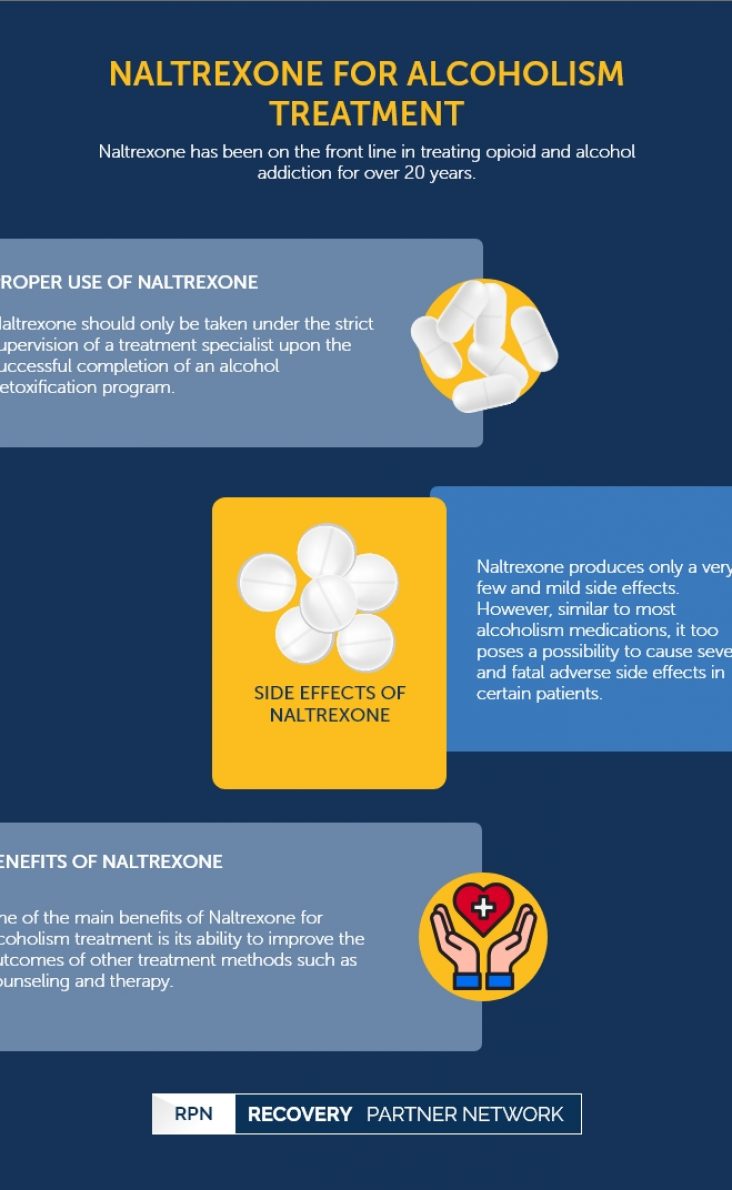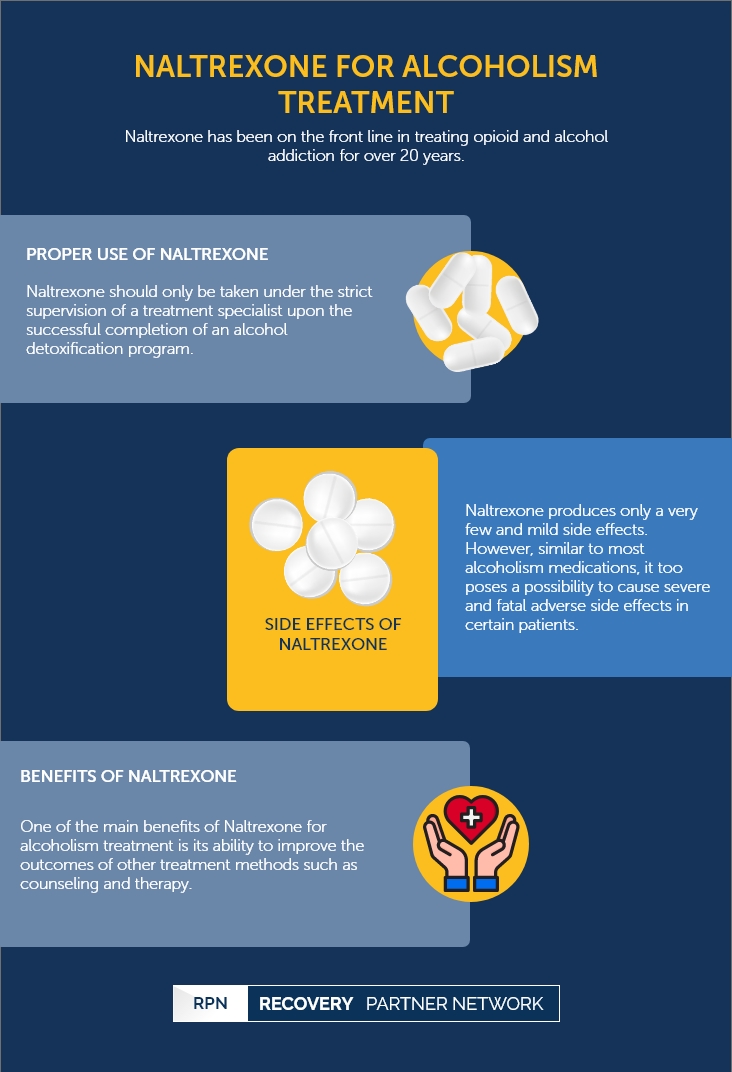Naltrexone has been on the front line in treating opioid and alcohol addiction for over 20 years.
Naltrexone for Alcoholism Treatment
Naltrexone for Alcoholism treatment | Table of Contents
Naltrexone for Alcoholism Treatment
Naltrexone was initially used to treat opioid addiction, including heroin addiction. Recovering patients who consume Naltrexone can no longer experience the pleasurable effects of opioids and thus motivate patients to discontinue their drug abuse. Although this medication was initially used during drug addiction treatment, it was later discovered to have the same effects on alcohol treatment. Since the brain interacts with alcohol in a similar manner to that of opioids, Naltrexone can suppress the pleasurable sensations and euphoria of both substances.
Although Naltrexone has a long, successful history of treating alcoholism, it’s not sufficient on its own. The medication doesn’t reduce alcohol cravings and any associated alcohol withdrawal symptoms. Hence, Naltrexone works best when combined with other treatments, such as therapy, counseling, 12-step programs, and other medications. The effectiveness in the treatment of patients who experience relapses is one proven benefit of this medication.
The body absorbs Naltrexone through the liver, leading to possible liver damage at high doses, and lower doses of this medication can decrease its overall effectiveness. Subsequently, this can be dangerous for patients suffering from alcohol-related liver damages.
FAQ
Naltrexone is known to be one of the most successful pharmacological treatments for alcohol dependence. However, it does not work for everyone.
Oral naltrexone does not cause withdrawal symptoms and hence does not require the use of the tapering down method.
Proper Use of Naltrexone
Like most other alcoholism treatment medications, Naltrexone is a prescription medication that should only be taken under the strict supervision of a treatment specialist. Even though the medication is not known to react with alcohol adversely, it should only be prescribed to patients after the successful completion of an alcohol detoxification program. Due to specific side effects, Naltrexone should only be recommended after a medical check by a physician to ensure that the patient does not have any liver complications and if the patient is not pregnant.
Generally, Naltrexone is prescribed for a short period in an inpatient rehab setting. Nevertheless, research suggests that prolonged use of the medication (over three months) is the most effective for maintaining sobriety in patients. Subsequently, Naltrexone is considered a safe medication during indefinite treatment.
Before being prescribed, Naltrexone patients must inform their physician of any medications currently being used as Naltrexone can have adverse reactions to certain medications. A single Naltrexone tablet is usually taken once a day with or without food.
It may also be prescribed as:
- Once every other day
- Once every third day
- Once every day except for one designated day of the week
A patient can take a missed dose if it’s not close to the next dose, as the doubling of doses remains unsafe, even if the patient has missed their previous dose.
FAQ
- Can you still get drunk while taking naltrexone?
- How long can you take naltrexone?
- What is the best time of day to take naltrexone?
Naltrexone blocks the euphoric effects and the feelings of intoxication of alcohol. However, it does not prevent an individual from being impaired during alcohol consumption.
Naltrexone is usually prescribed for 12 weeks or more, and the recommended dose is one tablet per day.
Many patients take their medication in the morning to help guarantee their continued treatment success for opioid use disorder or alcohol use disorder.
Side Effects of Naltrexone
Naltrexone’s side effects are well studied and documented due to its long history. Thus, the very few and mild side effects are among the prime reasons for its wide use in alcoholism treatment. However, similar to most alcoholism medications, it too poses a possibility to cause severe and fatal adverse side effects in certain patients, and hence Naltrexone is only prescribed at rehab settings to ensure the patient’s safety.
Common side effects of Naltrexone include:
- Anxiety and nervousness
- Headaches
- Abdominal pain
- Aches
- Insomnia
- Nausea and vomiting
- Diarrhea
- Tiredness
- Constipation
- Chills
- Rash
- Dizziness
- Increased or decreased energy
- Ringing in the ears
Less common but more severe Naltrexone’s side effects include:
- Suicidal thoughts
- Hallucinations
- Blurred vision
- Liver toxicity and failure
- Hypersensitivity to the drug
- Swelling in the face, feet, and legs
- Shortness of breath
FAQ
- What are the side effects of naltrexone?
- Do the side effects of naltrexone go away?
- Is naltrexone bad for your liver?
- Does naltrexone cause weight gain?
- Does naltrexone cause depression?
Side effects of naltrexone may include headaches, nausea, insomnia, fatigue, nervousness, dizziness, vomiting, and anxiety.
The side effects of naltrexone usually disappear after a few days once the body adjusts to the new medication.
Naltrexone may cause liver damage when taken in large doses.
Research shows that naltrexone can considerably lower insulin resistance, which is a frequent cause of weight gain.
Naltrexone can cause depression.
Benefits of Naltrexone
- Reduces the motivation to drink, especially among patients who are highly likely to relapse.
- Comparatively fewer and mild side effects than alternative alcoholism medications.
- Helps improve the outcome of other treatment methods like counseling and therapy.
- Therapeutic advantages are widely accepted to surpass the potential side effects.
FAQ
- Does naltrexone help you sleep?
- How long does naltrexone stay in your system?
- What’s it like to drink alcohol while on naltrexone?
Some patients may experience trouble sleeping while on naltrexone.
Naltrexone can be detected through a urine test for 4 to 6 hours, a blood test for up to 24 hours, a hair follicle drug test for up to 90 days, and a saliva test for up to 1 day.
Naltrexone will not make you feel sick or ill in the same manner as Antabuse (disulfiram) when consuming alcohol while on medication.
Recovery Partner Network
We aim to educate and empower. If you feel our library of resources does not cover your specific need, reach out to us, and we would be happy to help.
STATISTICS
© Copyright 2025


